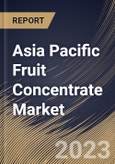Fruit concentrates are valued for intensifying the flavor of a wide range of products. They can provide a consistent and intense fruit flavor profile that is challenging to achieve with fresh fruit alone. They can extend products' shelf life, particularly in fruit juices, as they reduce water activity and inhibit microbial growth. This quality significantly impacts the distribution and availability of fruit-based products. These are cost-effective as they reduce the bulk and weight of fruit-derived ingredients, making them more affordable to transport and store. This economic advantage is a key driver for their widespread adoption.
Moreover, consumers are increasingly scrutinizing product labels, seeking those with fewer and more recognizable ingredients. Fruit concentrates, being a natural ingredient, align with the clean label movement, contributing to their popularity. There is a growing trend toward flavor fusion and incorporating exotic fruit varieties in various products. Fruit concentrates are integral to achieving unique and appealing flavor combinations.
The value of agriculture and food commerce between India and the Gulf region is one indication of India's locational advantage. According to the data given by the Agricultural and Processed Food Products Export Development Authority APEDA, India's exports of Processed Food was Rs. 59,580.72 Crores/ 7,408.64 USD Millions in 2022-23, which includes the share of products like Mango Pulp (Rs. 1189.66 Crores/ 147.60 USD Millions). Thus, increasing urbanization and the rapidly growing food and beverage industry in Asia will help boost the demand in the region.
The China market dominated the Asia Pacific Fruit Concentrate Market by Country in 2022, and would continue to be a dominant market till 2030; thereby, achieving a market value of $15,340.2 million by 2030. The Japan market is registering a CAGR of 4.7% during (2023 - 2030). Additionally, The India market would showcase a CAGR of 6% during (2023 - 2030).
Based on Distribution Channel, the market is segmented into B2B and B2C (Hypermarkets/supermarkets, Wholesale Stores, Online sales and Others). Based on Application, the market is segmented into Food & Beverage (Non-Dairy Beverages, Dairy based Beverages, Confectionary, Bakery, Snacks, Desserts & Condiments, and Others), Nutraceuticals & Supplements, Pet Food and Others. Based on Source, the market is segmented into Apple, Pineapple, Pear, Berries, Citrus Fruits, Grapes and Others. Based on countries, the market is segmented into China, Japan, India, South Korea, Singapore, Malaysia, and Rest of Asia Pacific.
The market research report covers the analysis of key stake holders of the market. Key companies profiled in the report include Ingredion Incorporated, Dohler GmbH, Archer Daniels Midland Company, AGRANA Beteiligungs-AG, Lemonconcentrate S.L.U, SunOpta, Inc., Kerry Group plc, Coöperatie Koninklijke Cosun U.A., Capricorn Food Product India Ltd. and The Coca Cola Company.
Scope of the Study
Market Segments Covered in the Report:
By Distribution Channel (Volume, Kilo Tonnes, USD Billion/Million, 2019-2030)- B2B
- B2C
- Hypermarkets/supermarkets
- Wholesale Stores
- Online sales
- Others
- Food & Beverage
- Non-Dairy Beverages
- Dairy based Beverages
- Confectionary
- Bakery
- Snacks
- Desserts & Condiments
- Others
- Nutraceuticals & Supplements
- Pet Food
- Others
- Apple
- Pineapple
- Pear
- Berries
- Citrus Fruits
- Grapes
- Others
- China
- Japan
- India
- South Korea
- Singapore
- Malaysia
- Rest of Asia Pacific
Key Market Players
List of Companies Profiled in the Report:
- Ingredion Incorporated
- Dohler GmbH
- Archer Daniels Midland Company
- AGRANA Beteiligungs-AG
- Lemonconcentrate S.L.U
- SunOpta, Inc.
- Kerry Group plc
- Coöperatie Koninklijke Cosun U.A.
- Capricorn Food Product India Ltd.
- The Coca Cola Company
Unique Offerings
- Exhaustive coverage
- The highest number of Market tables and figures
- Subscription-based model available
- Guaranteed best price
- Assured post sales research support with 10% customization free
Table of Contents
Companies Mentioned
- Ingredion Incorporated
- Dohler GmbH
- Archer Daniels Midland Company
- AGRANA Beteiligungs-AG
- Lemonconcentrate S.L.U
- SunOpta, Inc.
- Kerry Group plc
- Coöperatie Koninklijke Cosun U.A.
- Capricorn Food Product India Ltd.
- The Coca Cola Company








